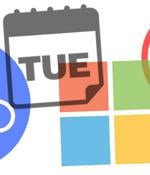Security News

A new ransomware strain called "Qlocker" is targeting QNAP network attached storage devices as part of an ongoing campaign and encrypting files in password-protected 7zip archives. In response to the ongoing attacks, the Taiwanese company has released an advisory prompting users to apply updates to QNAP NAS running Multimedia Console, Media Streaming Add-on, and HBS 3 Hybrid Backup Sync to secure the devices from any attacks.

Google on Tuesday released an update for Chrome web browser for Windows, Mac, and Linux, with a total of seven security fixes, including one flaw for which it says an exploit exists in the wild. The update comes after proof-of-concept code exploiting the flaw published by a researcher named "Frust" emerged on April 14 by taking advantage of the fact that the issue was addressed in the V8 source code, but the patch was not integrated into the Chromium codebase and all the browsers that rely on it, such as Chrome, Microsoft Edge, Brave, Vivaldi, and Opera.

Security hardware manufacturer SonicWall is urging customers to patch a set of three zero-day vulnerabilities affecting both its on-premises and hosted Email Security products. "In at least one known case, these vulnerabilities have been observed to be exploited 'in the wild,'" SonicWall said in a security advisory published earlier today.

The U.S. government on Thursday warned that Russian APT operators are exploiting five known - and already patched - vulnerabilities in corporate VPN infrastructure products, insisting it is "Critically important" to mitigate these issues immediately. According to the NSA, the five vulnerabilities should be prioritized for patching alongside the newest batch of Exchange Server updates released by Microsoft earlier this week.

Microsoft had its hands full Tuesday snuffing out five zero-day vulnerabilities, a flaw under active attack and applying more patches to its problem-plagued Microsoft Exchange Server software. Of note, the U.S. National Security Agency released information on four critical Exchange Server vulnerabilities impacting versions released between 2013 and 2019.

Google on Tuesday released a new version of Chrome web-browsing software for Windows, Mac, and Linux with patches for two newly discovered security vulnerabilities for both of which it says exploits exist in the wild, allowing attackers to engage in active exploitation. UPDATE: Agarwal, in an email to The Hacker News, confirmed that there's one more vulnerability affecting Chromium-based browsers that has been patched in the latest version of V8, but has not been included in the Chrome release rolling out today, thereby leaving users potentially vulnerable to attacks even after installing the new update.

Microsoft today released updates to plug at least 110 security holes in its Windows operating systems and other products. The patches include four security fixes for Microsoft Exchange Server - the same systems that have been besieged by attacks on four separate bugs in the email software over the past month.

The US Cybersecurity and Infrastructure Security Agency has ordered federal agencies to install newly released Microsoft Exchange security updates by Friday. Today, Microsoft released security updates for four Microsoft Exchange vulnerabilities discovered by the NSA. These Exchange vulnerabilities are capable of remote code execution, with two vulnerabilities not requiring attackers to authenticate first.

Microsoft today has released security updates for Exchange Server that address a set of four vulnerabilities with severity scores ranging from high to critical. The flaws affect on-premise Exchange Server versions 2013 through 2019 and while there is no evidence of being exploited in the wild, Microsoft assesses that threat actors are likely to leverage them as soon as they create an exploit.

Just weeks after a wave of major in-the-wild zero-day attacks against Exchange Server installations globally, Microsoft is raising a fresh alarm for four new critical security flaws that expose businesses to remote code execution attacks. The four new Exchange Server vulnerabilities were fixed as part of this month's Patch Tuesday bundle and because of the severity of these issues, Microsoft has joined with the U.S. National Security Agency to urge the immediate deployment of the new fixes.